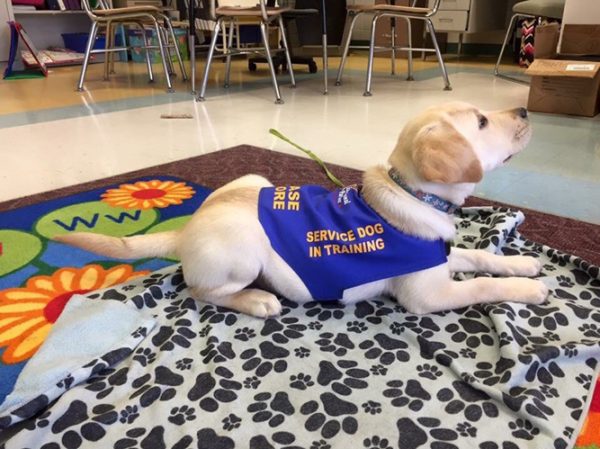A longtime professional dog trainer in Newtown has launched The Exceptional Partner Service Dogs, a program to identify, raise and train psychiatric service dogs to be matched ”“ at no cost ”“ with children and adults suffering from psychiatric disabilities.
The twist, explained Abby Hill, who has operated The Exceptional Pet Dog Training LLC for 17 years, is that the nonprofit has teachers in the Newtown school system raising the puppies to educate students and faculty about the process of training a service dog and their role in helping treat some mental health issues.
The program”™s first five Labrador puppies ”“ Harry, Blue, Bella, Jake and Taco ”“ are being rotated every three months among educators at Newtown High School, Reed Intermediate and Sandy Hook Elementary School. Although students are not allowed to interact with the 10-month old pups, their mere presence can have a positive effect, Hill said.
 “People”™s faces just light up when they see a puppy, even if they”™re not ”˜dog people,”™” Hill said. “Research has shown that endorphins are released when you encounter therapy or service dogs.”
“People”™s faces just light up when they see a puppy, even if they”™re not ”˜dog people,”™” Hill said. “Research has shown that endorphins are released when you encounter therapy or service dogs.”
A study at the Department of Education at the University of Erlangen-Nuremberg in Germany showed that having a dog in the classroom, even without direct physical contact, can promote positive social interaction, increase concentration and reduce stress and anxiety.
As opposed to therapy dogs, which are trained to visit facilities such as hospitals, nursing homes, and schools, where people are encouraged to pet and play with the canines, service dogs “are trained to ignore everyone but their handler,” Hill said. “They”™re considered to be medical equipment, like an inhaler or wheelchair, and so have public-access rights that therapy dogs don”™t.”
Hill”™s interest in service dogs was sparked by her mother”™s dog, who helps with her bipolar condition. “Businesses will sometimes deny access, but that”™s because they don”™t know the law,” she said. “That can be upsetting to someone with a psychological disability, just as it would be to someone in a wheelchair being denied entry somewhere.”
Exceptional Partner handlers carry cards explaining the benefits of service dogs, which are covered under the Americans with Disabilities Act. The ADA requires state and local government agencies, businesses, and nonprofit organizations that provide goods or services to the public to make “reasonable modifications” in their policies, practices, or procedures when necessary to accommodate people with disabilities, with service animals falling under that guideline. “Entities that have a ”˜no pets”™ policy generally must modify the policy to allow service animals into their facilities,” according to the ADA.
While the hardest part for most Newtown students has been squelching their desire to pet or otherwise interact with the dogs, Hill noted allergies have been a concern. The solution was to add Noodle, a hypoallergenic Labradoodle.
Launched in January as a nonprofit, Exceptional Partner received its first purebred Labradors from an experienced dog breeder in West Virginia at the recommendation of Assistant Dogs International; the five 8-week-old puppies arrived on March 17 and entered the schools in May.
The program was approved by Newtown Superintendent Joseph Erardi, who has been “extremely supportive,” Hill said. “And we”™ve seen a lot of students open up and have conversations about their personal concerns and fears with teachers and counselors ”¦ which is what we want.”
Hill said that Labs were chosen for their proven success as service dogs, “but any dog can be a service dog, depending on their temperament and ability to be trained.”
A final assessment of the puppies will be done next spring, after which they will be matched with a person with psychiatric disabilities. Hill said she”™s already being deluged with requests for adoption, “which is the hard part. A lot of people who are in need want a service dog now, but the whole process can take up to two years.”
Although Hill was one of the first people in the state to become a certified professional dog trainer through the Certification Council of Professional Dog Trainers, she said such accreditation is not necessary to present oneself as a dog trainer ”“ or even a service-dog trainer.
Hill said the cost of adopting, raising, training and providing proper health care for her service dogs for the first two years of their lives prior to placement is approximately $25,000 per animal. For now she is essentially supporting the nonprofit with the income she makes through her regular dog training services, but she is in the process of launching a number of fundraisers, including a GoFundMe page for neutering and spaying. Donations have also been coming in from the puppy raisers”™s family and friends, she said.





















Comments 1